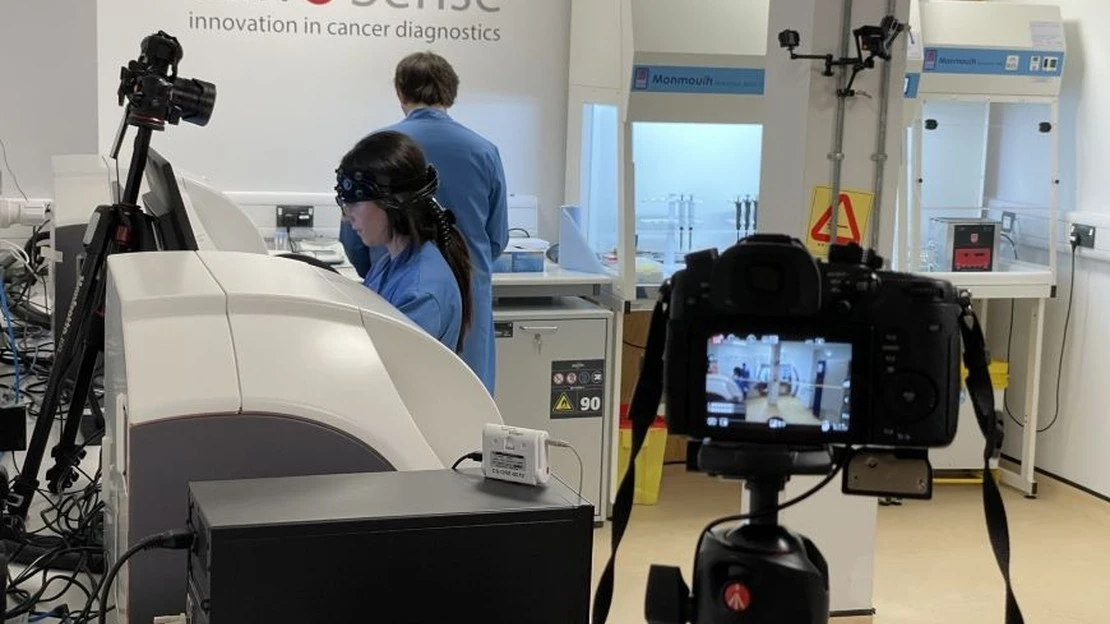The University of Wales Trinity Saint David’s (UWTSD) Assistive Technologies Innovation Centre (ATiC) and its partner, Hywel Dda University Health Board’s TriTech Institute, are undertaking an 18-month collaborative project with Welsh life science company CanSense Ltd.
The CanSense-CRC is pioneering a blood test for early colorectal cancer (CRC) – or bowel cancer – detection. The test, which comprises hardware and software components, can deliver rapid results in 48 hours. The test is designed to help clinicians differentiate between patients with varying degrees of risk of bowel cancer, prioritising higher risk patients to be fast-tracked to definitive diagnosis and treatment.
From trial clinical studies, the CanSense-CRC test has the potential additional benefit of reducing the demands on more invasive colonoscopy diagnosis by 65%. This reduction would significantly reduce the financial burden on the NHS, with an estimated* potential cost saving of £250M a year in a reduction of colonoscopies, and further cost savings in a reduction in late-stage cancer care.
The fast, inexpensive, and scalable test for the early diagnosis of bowel cancer, the second most common cancer globally, uses artificial intelligence-based modelling (AI). CanSense’s CRC Test has the potential to positively reshape bowel cancer diagnosis through early detection, bettering patient outcomes, and heightening operational efficiency within the healthcare landscape.
ATiC, which is based in Swansea’s SA1 Innovation Quarter, is providing its research expertise in User Experience (UX) and device and process usability to assess the CanSense-CRC test technology.
The TriTech Institute, which is based in Bynea, Llanelli, and of which ATiC is a key academic partner, is providing the research team with guidance and support around QMS ISO13485 standards and will carry out a risk assessment and compliance checks to support the introduction of the CanSense-CRC test into the colonoscopy cancer diagnostic pathway in the NHS.
The aim of ATiC and TriTech’s work is to support CanSense, a Swansea University spin-out company located at the Institute of Life Science 2, to develop into a fully-fledged product/service offering for NHS use, which will improve early cancer detection and address the challenges facing UK cancer care as it recovers from the COVID-19 pandemic. This means reducing waiting times, avoiding late-stage diagnosis and ultimately saving more lives.
This collaborative project, which will be completed in April 2025, is supported with funding from the UK’s national innovation agency, Innovate UK, which supports business-led innovation in all sectors, technologies, and UK regions.
Dr Fatma Layas, ATiC Innovation Fellow, said: “ATiC is working with CanSense to provide external expertise around device usability assessment of the CanSense-CRC test technology. The three key user groups involved in our assessment are the clinician or GP requesting the test and acting on the result; the phlebotomist taking the blood sample; and the CanSense laboratory technician conducting the test.
“ATiC is initially undertaking research activity with these groups to explore and understand user needs and expectations in relation to the test’s technology, using methods including focus groups, semi-structured interviews, and observational studies.”
“In the observational studies, we are utilising ATiC’s state-of-the-art research tools and capabilities including the Noldus Behavioural Observation Lab, and Observer XT and FaceReader assessment systems; Audio-Visual Capture Systems, Tobii Pro eye tracking systems; and Physiological Monitoring using the Utilize Artinis OctoMon (fNIRS) frontal brain activity monitoring system,” added Tim Stokes, ATiC Innovation Fellow.
“By employing these methods and tools, we aim to provide a detailed and valuable assessment of the user experience associated with the CanSense-CRC test, ultimately contributing to the refinement and improvement of the testing process.”
Professor Chris Hopkins, Consultant Clinical Scientist, Head of Innovation and the TriTech Institute, Hywel Dda University Health Board, and ATiC’s Clinical Director, said: “To explain it in simple terms, a CanSense-CRC test returning a high-risk result indicates a high likelihood of the presence of bowel cancer or advanced adenoma (bowel polyp), which is considered a precursor to it. The patient will then be referred for a high-priority colonoscopy to confirm or exclude the diagnosis.
“A CanSense-CRC test returning a low-risk result indicates a low likelihood of the presence of bowel cancer or advanced adenoma, and the patient will be referred for a lower-priority colonoscopy to confirm or exclude the diagnosis.
“This bowel cancer diagnostic pathway change will be piloted in collaboration with two Welsh health boards, to provide clinical performance and health economic evidence for analysis.
“This project exemplifies how health boards, academia, and companies can work in partnership to develop and evaluate innovative technologies, delivering better patient outcomes.”
Dr Adam Bryant, CEO of CanSense, said: “CanSense places significant focus on transforming outcomes and changing people’s lives through the early detection of bowel cancer. We have full awareness that to do this with the upmost success, we must get the CanSense-CRC Test into the hands of clinicians and GPs; the sooner we can achieve this, the sooner we can claim to have aided the NHS in identifying high-risk cancer patients and prioritising their diagnostic/treatment journey.
“This simple and familiar blood test, using liquid biopsy, could allow the NHS to function more efficiently with higher cost savings. Working alongside ATiC and TriTech within this project brings opportunity for more expert opinions and inspiration. Collaborating with a collective purpose is both a joy and advantage; helping us overcome the technological and regulatory obstacles needed to accelerate CanSense to market.”


